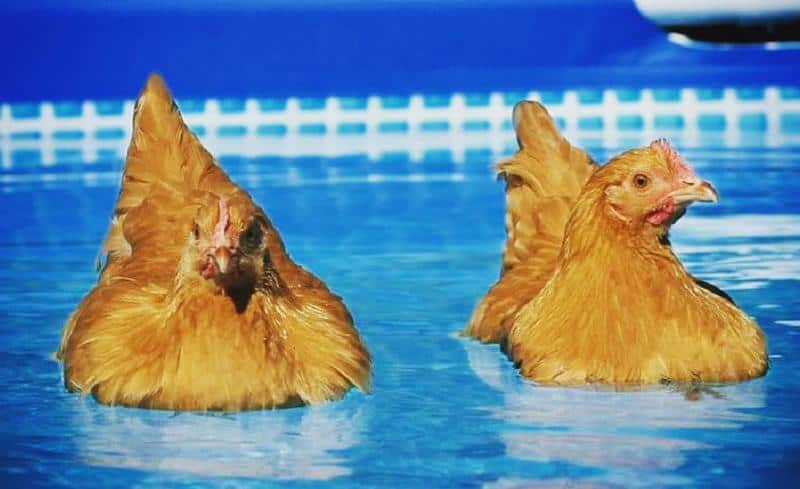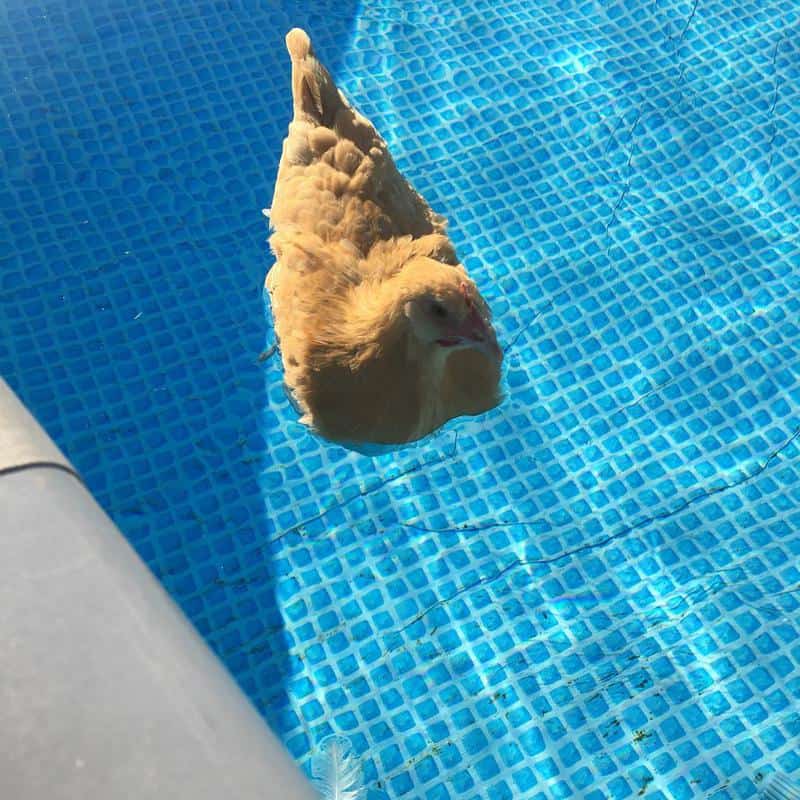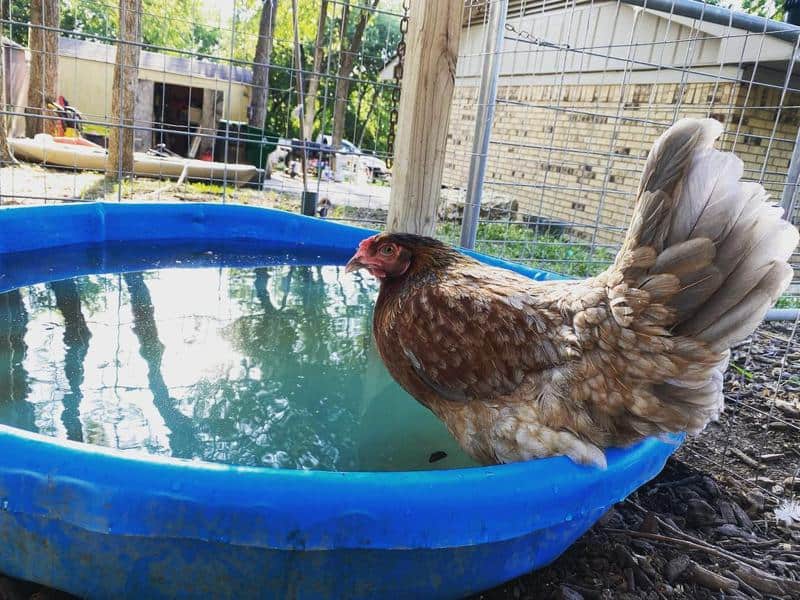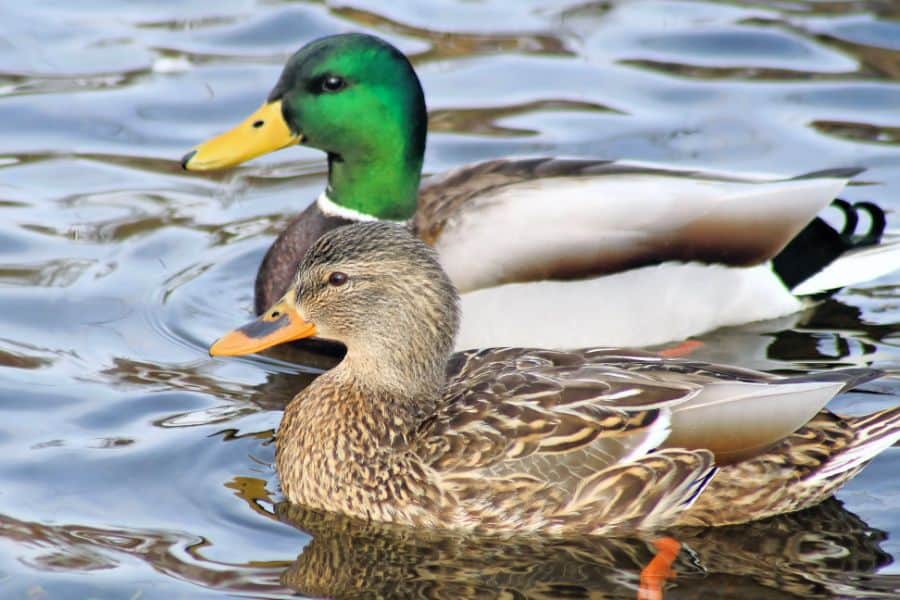A chicken is one of those animals you don’t associate with water. We couldn’t imagine ducks or geese without also thinking of a water body, but it seems like a chicken could go its entire life without coming close to a puddle.
For chicken owners living next to a pond or lake, or those with a pool in their home, there is a possibility that a series of events will result in your chicken being in the water. Therefore, it is of some importance to know whether your chickens can swim.

As it usually is with such questions, a simple yes or no doesn’t do the issue justice. Chickens are complicated creatures and just because we never see them doing something doesn’t mean they can’t do it.
Read on as we explain why your chickens have a different relationship with water compared to waterfowl, and what you can do about it to ensure they are safe.
Chickens Can Swim
Chickens can swim but it is not something they take to naturally. Unlike your ducks and geese, they are simply not built to be good at swimming.
Many chicken owners have tested this theory out as you can see in the video below.
While many would like to conclude that the chickens are great at swimming, you will notice that many of the chickens in the videos try to make their way out of the water as quickly as possible.
The chickens seem to certainly be able to float, however, they don’t do it as gracefully as a duck does and they don’t seem to enjoy the experience as much. You may also notice that the chickens in the water are usually put there by someone.
This means that chickens can probably swim well enough to get themselves out of the water, but being in a pool of water isn’t something they seem to have a natural inclination towards. To better understand this, it’s good to first know why ducks and geese are good at swimming.
What Makes Ducks Good at Swimming?
There is no domestic fowl that is as easily associated with water as the duck. There is a good reason for this because ducks are incredible once they get in the water.
Ducks move about almost effortlessly on water bodies and this is because they have several adaptations that make this easy. These are:
- Webbed feet: Ducks have webbed feet, and this makes it easy for them to move through water. The webbed feet served as paddles propelling the duck’s body on water.
- Uropygial gland: The uropygial gland secretes an oil-like substance that repels water from the duck’s feathers so they don’t get waterlogged. Waterlogged feathers would be heavier and more likely to drag the duck underwater.
- Air-trapping feathers: The feathers on ducks are adapted to trap air between them. This makes their bodies more buoyant, so they float with ease.
- Hollow bones: This is a common feature in birds. Hollow bones are an adaptation that makes it easier for birds to fly but also makes it easier for some birds to float and get around in water.
Why Aren’t Chickens Better at Swimming?
Now that you know why ducks are good at swimming, it’s easier to understand why chickens are only marginally good swimmers and seem to avoid water if they can.
Like all birds, chickens also have hollow bones. This is one reason why they are likely to float when they are first placed in water.
However, chickens don’t have webbed feet, and this makes it challenging for them to move about once they are in the water.
If you ever go swimming, try swimming with your fingers open versus when your hands are tightly cupped to understand the difference between webbed and unwebbed feet.
As it turns out, chickens also have a uropygial gland just like ducks. This gland is located at the base of the tail and may be seen after heavy molting.
Although this gland imparts some of the same waterproofing qualities in chickens, it is simply more developed in waterfowl like ducks compared to other birds. Thus, chicken feathers are not nearly as water-repellent as ducks’.
Do Chickens Enjoy Being in Water?

Although there are reports of chickens that enjoy taking a dip in water every now and then, there is no conclusive evidence that this is an experience they enjoy.
However, some of the things that you may observe about chickens and water are:
- Chickens are not likely to get in water on their own accord under normal conditions.
- Chickens will occasionally panic if placed in water even if they float.
- Chickens in water won’t be there for a long time and their movements in water are awkward.
With this in mind, it is difficult to conclude that chickens find the experience of being in water enjoyable.
Considering the abundance of pools, ponds, and lakes in many farms, if chickens liked being in water, we’d probably see them splashing about more often than we do.
Can Chickens Drown in Water?
Having established that chickens don’t take to the water as naturally as ducks or geese, it is important to assess if water also poses a risk to them.
Chicken feathers don’t have the same ability to repel water as duck feathers. Therefore, if exposed to water, chicken feathers will become waterlogged after a relatively short time, and wet feathers weigh more.
The increased weight of the feathers can drag the chicken’s body below the surface causing it to drown. Due to this issue, any chicken in sufficiently deep water could be at risk of drowning after a short time.
What Other Risks Does Water Pose?
Drowning is not the only risk that chickens face when in water. There are other risks present whether your chicken gets in water or even if their feathers become wet.
Wet feathers offer much less insulation from cold weather compared to dry ones. This increases the risk of your chicken suffering from chills and hypothermia can easily set in.
If your chicken gets wet, especially when it’s cold outside, you should try and dry it as quickly as possible.
How Long Can a Chicken Survive in Water?
Chickens’ feathers will get waterlogged quickly and this puts a limit to how much time they can spend in water.
It is said that in around 10 to 15 minutes, a chicken swimming in water will be too tired to continue. It’s also possible that their feathers would have become heavy with water long before then.
Chickens that are particularly not fond of water may panic and start flapping their wings. This can soak their feathers even faster, making it less likely for them to survive without a quick rescue.
What to Do if Your Chicken Falls in Water
The first thing you should do is to get the chicken out of the water without putting yourself at risk. This may not be necessary since chickens seem to try to find their way out of the water quickly.
Once your chicken is out of the water, you should aim to quickly dry it off especially if it’s chilly outside. Methods you can use to dry off your chicken include:
- Using a towel
- Using a hairdryer set to a low setting.
- Putting them under a heat lamp like the ones used to keep chicks warm.
It may not be necessary to dry the chicken on a hot summer day, but you shouldn’t let them spend the night with cold feathers.
Is There Any Reason to Have Chicken in Water?
In most cases, a chicken should be able to go its whole life without getting into a pool of water.
Chickens don’t need to bathe in water to get clean because that is what dust baths are for. Some chickens may develop some affinity for swimming especially if encouraged by the owner, but chickens that never swim don’t seem to be missing out.
One situation where there is a benefit to having a chicken in water is when a hen becomes egg-bound. Dipping an egg-bound hen in warm water can help her to relax and make it easier for her to expel the egg.
If you’ve dipped your chicken in water for any reason, be sure to dry her off quickly to avoid complications like hypothermia.
Can Chicks Be Made into Good Swimmers

Not only are chicks exceptionally bad at swimming, but they can also drown in shallow pools of water. Their under-developed feathers are also likely to become waterlogged a lot faster than those of full-grown chickens.
If you’re intending to raise chicks, you need to take measures to keep them away from pools of water. Even a waterer that is designed for larger chickens can pose a drowning risk to very small chicks.
Chicks are also more susceptible to temperature changes. If their feathers get wet, they can quickly become cold leading to fatal health problems.
There are several measures you can take to lower the risk of drowning or chills in your chicks including:
- Keeping the chicks well away from pools of water including puddles formed after rain.
- Using smaller waterers to give your chicks water.
- Ensuring your chicks are never out in the rain.
- Drying any chicks that get wet as quickly as possible.
Also Read:
Chickens Can Swim but Probably Shouldn’t
In the world of birds, chickens don’t rank high on the list of proficient swimmers. Chickens can float and make their way through water, but they don’t do it with the ease and grace of seasoned waterfowl.
Additionally, chickens’ feathers are not as water-repellant as those of ducks and this means they take on water quite quickly. Their feathers can become waterlogged even faster if the chicken panics and starts thrashing about in the water.
If a chicken spends more than a few minutes in a sufficiently deep pool of water, there is a real risk it will drown. Wet feathers can also result in hypothermia and other health problems for your chicken even if it makes it out of the water.
Except in the exceptional circumstances that demand it, there is no reason for your chickens to be in water. They can swim for short periods of time, but they are not well adapted to life on water and there doesn’t seem to be an upside for the chickens.

